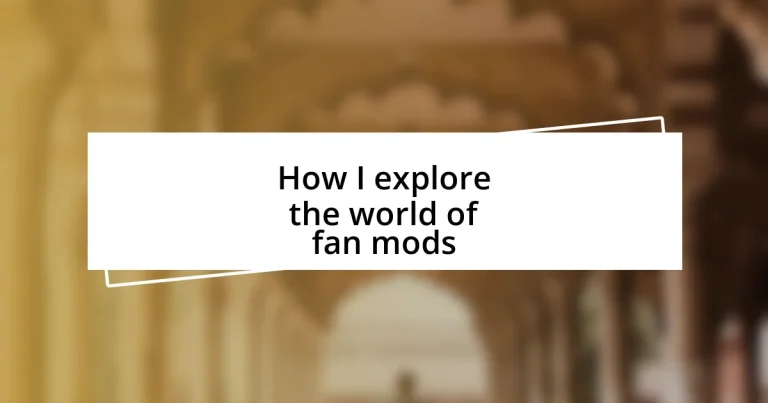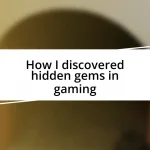Key takeaways:
- Fan mods enhance the original gaming experience, fostering community and creativity among dedicated fans.
- Various types of mods exist, including cosmetic, gameplay tweaks, total conversions, expansion packs, and quality of life improvements.
- Legal considerations are vital for mod creators, requiring knowledge of intellectual property rights and adherence to developer guidelines.

Understanding fan mods
Fan mods, short for fan-made modifications, are creative alterations to video games, movies, or other media. They add unique features or enhance existing ones, often reflecting the passions of dedicated fans. I remember the thrill I felt when I first downloaded a mod that transformed a favorite game of mine into a whole new experience—it’s like finding hidden treasure in a world you thought you knew.
What motivates fans to create these mods? For many, it’s about expressing love for a franchise or exploring ideas that the original creators might not have considered. I often wonder how the original creators feel about these mods. Do they appreciate the additional creativity, or do they see them as a threat to their artistry? Personally, I find that these mods not only breathe new life into familiar narratives but also spark a deeper connection to the stories and characters I enjoy.
Understanding fan mods involves recognizing the collaborative spirit they embody. It’s fascinating to see how communities form around the creation and sharing of these mods. I remember attending a virtual meetup where enthusiastic gamers showcased their latest creations. The passion in the room was palpable, and it struck me that fan mods serve as a bridge, connecting fans across the globe and enriching the overall experience for everyone involved.

Types of fan mods
When diving into the types of fan mods, I can’t help but marvel at the diversity that emerges from this creative space. They come in various forms, each offering unique experiences tailored to different types of fans. It’s reminiscent of my teenage years, when I stumbled upon a mod that added entirely new quests to a game I had already played extensively. That excitement felt like discovering a hidden level in a favorite childhood game.
Here’s a breakdown of popular types of fan mods:
- Cosmetic Mods: These change the appearance of characters or environments, like skin packs or texture enhancements.
- Gameplay Mods: They tweak mechanics to create new experiences, such as increasing difficulty or introducing unique abilities.
- Total Conversions: These transform the entire game, often changing the setting, characters, and storyline.
- Expansion Packs: These add additional content, such as new maps, quests, or items, enriching the original game.
- Quality of Life Mods: They optimize user experience by fixing bugs or improving interface elements, making the game more enjoyable.
I recall the joy I felt when I first tried a total conversion mod that turned my beloved fantasy RPG into a futuristic sci-fi adventure. It was such a wild shift, yet the creative twists kept me on my toes. It’s this kind of innovation that makes exploring fan mods so exhilarating—it’s like stepping into worlds shaped by the imaginations of fellow enthusiasts.
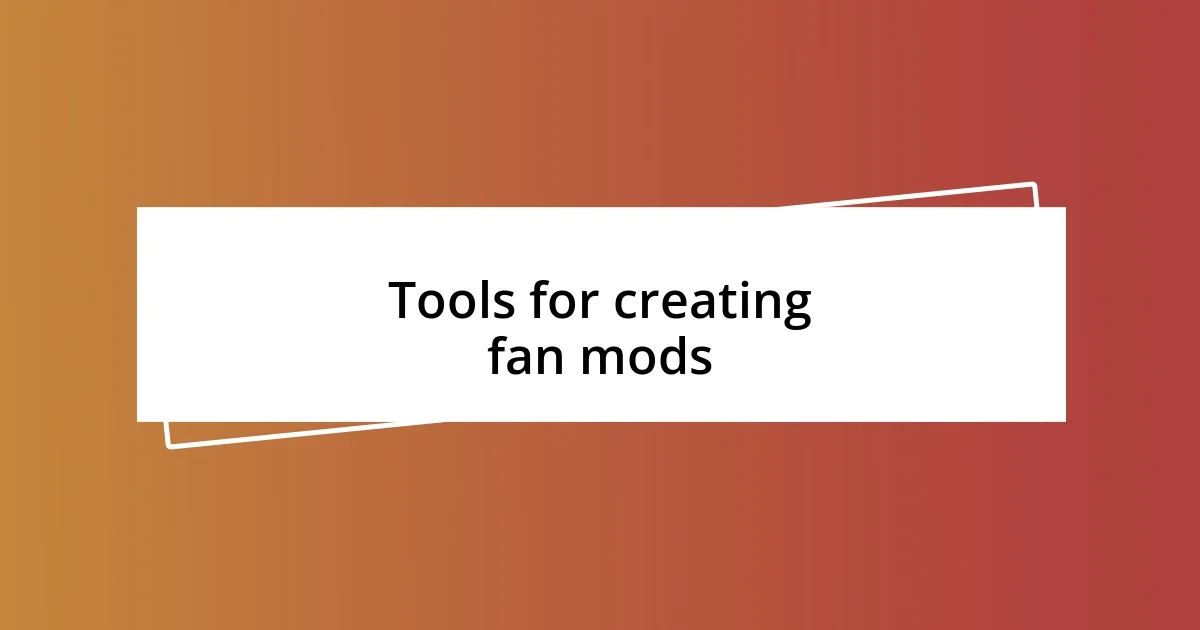
Tools for creating fan mods
Creating fan mods is a craft that requires the right tools to bring your imaginative visions to life. From my experience, two popular software options are Tiled and GIMP. Tiled is fantastic for level design and layout, while GIMP is ideal for creating and editing graphics. The diversity of features in each makes it easier to tackle different aspects of modding without feeling overwhelmed.
I also encourage exploring the modding communities online, as they often provide essential tools like Nexus Mod Manager, which simplifies mod installation. Additionally, many fans swear by Unreal Engine for more complex projects. Believe me, diving into Unreal Engine can feel daunting at first, but the creative possibilities it offers are astounding. I still remember the excitement I felt when I saw everything come together in a mod I was working on; it’s a feeling like no other.
Lastly, collaboration tools such as Discord are invaluable for real-time brainstorming and support. These platforms allow you to engage with like-minded individuals who are just as passionate about mods as you are. When I first joined a modding Discord channel, I found not only tips and shared resources but also a sense of camaraderie that truly elevated my own modding journey.
| Tool | Purpose |
|---|---|
| Tiled | Level design and layout |
| GIMP | Graphics creation and editing |
| Nexus Mod Manager | Mod installation management |
| Unreal Engine | Complex modding projects |
| Discord | Community engagement and support |

Popular fan modding communities
When I first ventured into fan modding communities, I was struck by the sheer passion radiating from every member. Platforms like Nexus Mods and ModDB served as treasure troves of creativity, each boasting a vibrant collection of mods that invite exploration. Have you ever immersed yourself in a community where everyone shares your love for a specific game? It’s a rush that keeps you coming back for more.
One of my favorite experiences was engaging with the Skyrim modding community on forums and Discord. The camaraderie was palpable, with fellow modders eagerly sharing their latest creations and tips. I vividly remember the thrill of collaborating with others on a mod that added a whole new quest line. Seeing our ideas merge and take shape into something entirely new felt like a deeply rewarding teamwork experience. Isn’t it incredible how shared interests can lead to such meaningful relationships?
The feeling of discovering a mod that completely reinvents a game is something every fan should experience. Not just the discovery itself, but the way it connects you with others who share that same exhilaration. Joining discussions about the latest mods, sharing reactions, and helping troubleshoot issues are just part of what makes these communities special. It creates an atmosphere of innovation where passion fuels creativity, often leading to stunning results that can redefine a gaming experience.
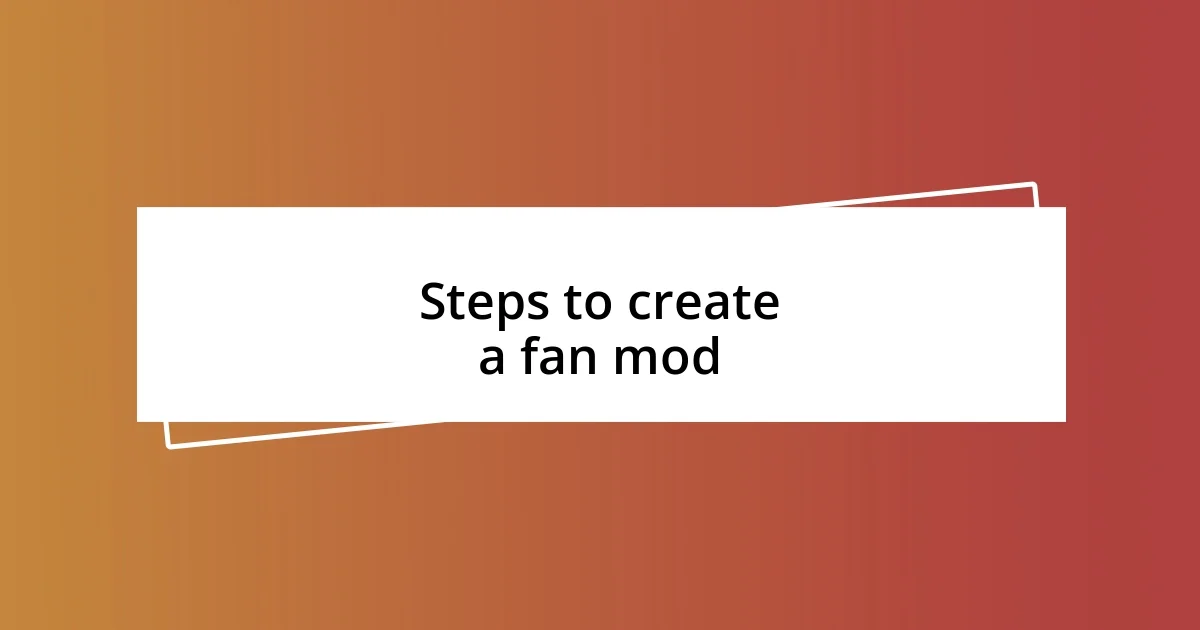
Steps to create a fan mod
To create a fan mod, I start with a brainstorming session where I jot down my ideas, often fueled by my favorite game moments. It’s exciting to think about how I can add new experiences or tweak existing ones. Have you ever had a moment in a game that sparked your imagination? Those moments are gold when it comes to modding.
Once I have a solid concept, I move on to planning. This involves mapping out the elements I want to modify or create and deciding which tools to use. I can still recall the first time I sketched out a map for a mod; seeing my ideas visually laid out gave me a tangible way to work towards my vision. That feeling—knowing you’re shaping something new—can be incredibly motivating.
Finally, it’s all about the trial and error phase. I dive into the software, making adjustments and testing as I go. There are moments of frustration; believe me, I’ve had my fair share of bugs and crashes. But there’s nothing quite like the thrill of resolving an issue and watching my mod come to life. Every time I playtest and make improvements, it’s like sculpting a statue; each tweak reveals something unique that I can’t wait to share with the community. Isn’t it amazing how persistence can transform a simple idea into something truly engaging?

Sharing your fan mod
Once I’ve crafted my fan mod, sharing it with the world feels like the exhilarating final step of a creative journey. There’s an electric feeling when I upload my creation, knowing that it might resonate with fellow gamers. Have you ever felt a rush of excitement when someone comments on your work, expressing appreciation or curiosity? It’s as if you’ve opened a door to a new world where others can experience your imagination.
I often choose to share my mods on platforms like Nexus Mods, where the community’s feedback can be both encouraging and constructive. I remember my first upload; I was anxious yet hopeful. The moment I received my first comment—someone praising the intricacies of a character I’d modified—was unforgettable. That validation not only fueled my passion but also enhanced my sense of belonging within the community. Isn’t it fascinating how feedback can motivate us to innovate even further?
Another great aspect of sharing is connecting with players who use my mods. Engaging in conversations about their experiences or hearing how my creations have altered their gameplay serves as a powerful reminder of why I mod in the first place. It’s often surreal to see someone streaming my mod or discussing it in forums. In those moments, I realize that sharing my fan mod transcends mere creativity; it’s about fostering community and building relationships around a shared love for gaming. Who would’ve thought that a simple mod could create such a profound connection?
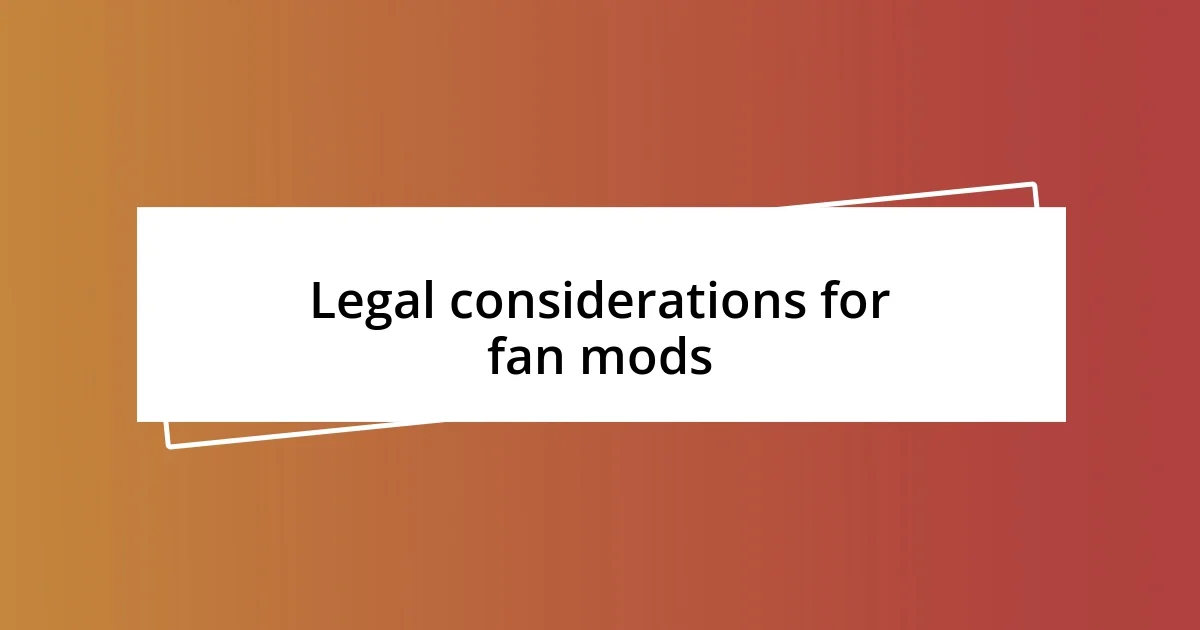
Legal considerations for fan mods
When diving into the world of fan mods, it’s crucial to navigate the legal landscape. I’ve often felt a twinge of uncertainty when I consider the ownership of intellectual property (IP). Many games have strict guidelines regarding modifications, so it’s essential to check the terms and conditions. Have you ever hesitated before sharing your work because you worried about potential repercussions? Trust me, I’ve been there. Knowing your rights can make a significant difference in how confidently you share your creations.
I remember the first time I either encountered a takedown request. It was disheartening to see a beloved mod suddenly disappear because it clashed with the developer’s policies. While many studios support fan creations, others may take a more protective stance. It’s a balancing act—knowing how to respect the original material while expressing your creativity. How can we ensure our mods breathe new life into a game without stepping on toes? Being familiar with the legal landscape allows for exploration while respecting boundaries.
Additionally, I’ve come across various licenses that dictate how fan mods can be used or shared. For instance, Creative Commons licenses can provide clearer guidelines for collaboration and distribution. Engaging with communities focused on these legal aspects not only safeguards my work but also enriches my understanding. Have you ever participated in a discussion about licensing? I found that the more I learn about legal considerations, the more I appreciate the balance between creativity and respect for others’ work.












